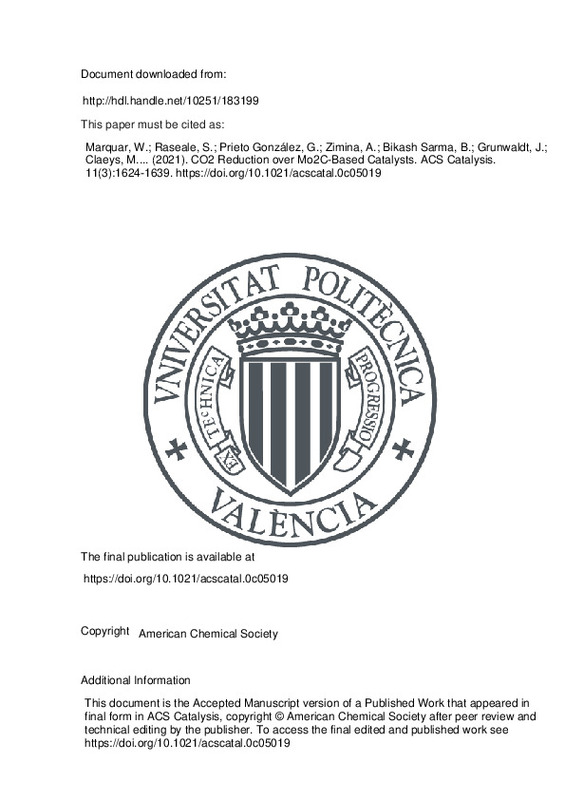JavaScript is disabled for your browser. Some features of this site may not work without it.
Buscar en RiuNet
Listar
Mi cuenta
Estadísticas
Ayuda RiuNet
Admin. UPV
CO2 Reduction over Mo2C-Based Catalysts
Mostrar el registro sencillo del ítem
Ficheros en el ítem
| dc.contributor.author | Marquar, Wijnand
|
es_ES |
| dc.contributor.author | Raseale, Shaine
|
es_ES |
| dc.contributor.author | Prieto González, Gonzalo
|
es_ES |
| dc.contributor.author | Zimina, Anna
|
es_ES |
| dc.contributor.author | Bikash Sarma, Bidyut
|
es_ES |
| dc.contributor.author | Grunwaldt, Jan-Dierk
|
es_ES |
| dc.contributor.author | Claeys, Michael
|
es_ES |
| dc.contributor.author | Fischer, Nico
|
es_ES |
| dc.date.accessioned | 2022-06-10T18:06:51Z | |
| dc.date.available | 2022-06-10T18:06:51Z | |
| dc.date.issued | 2021-02-05 | es_ES |
| dc.identifier.issn | 2155-5435 | es_ES |
| dc.identifier.uri | http://hdl.handle.net/10251/183199 | |
| dc.description | This document is the Accepted Manuscript version of a Published Work that appeared in final form in ACS Catalysis, copyright © American Chemical Society after peer review and technical editing by the publisher. To access the final edited and published work see https://doi.org/10.1021/acscatal.0c05019 | es_ES |
| dc.description.abstract | [EN] Four Mo-based catalysts were prepared via three different synthesis techniques supported on SiO2 and/or SBA-15. By means of complementary in situ characterization techniques, the carburization process and the final characteristics of these catalysts were investigated. Additionally, the four catalysts were evaluated for the activation of CO2 in the absence and presence of H-2 (reverse water-gas shift, RWGS). The results suggest that CO2 reacts via a dissociation on the carbide surface, forming adsorbed oxygen surface species. Severe oxidation of the carbide into its oxidic phases (MoO2 or MoO3) only occurs at temperatures above 850 K in the presence of CO2. O-2 dissociates on the carbide surface when introduced at low concentrations (1 vol %) at room temperature, but when exposed to higher concentrations, a strong exothermic bulk re-oxidation reaction occurs, forming MoO2. All four catalysts show high RWGS activity in terms of CO2 conversions with a minimum CO selectivity of 98% without any signs of bulk catalyst oxidation. Although minimal, the observed deactivation is suggested to be primarily due to phase changes between Mo2C allotropes (beta-phase, oxycarbide, and eta-phase) and/or sintering of the active phase. | es_ES |
| dc.description.sponsorship | All members affiliated with the Catalysis Institute and c*change would like to gratefully acknowledge the financial support received from the DST-NRF Centre of Excellence in Catalysis (c*change) and the University of Cape Town (UCT). We acknowledge Diamond Light Source for time on B18 as part of the Block Allocation Group beamtime of the UK Catalysis Hub in December 2018. A special thanks goes out to R. Cerpath and M. Malatji for their contributions in RWGS catalyst testing as part of their B.Sc. final year project; S. Govender, R. Geland, S. Klink, and S. Nyimbinya of the Analytical Laboratory in the Department of Chemical Engineering at UCT for the BET and ICP-OES analysis. M. Jaffer (UCT) for his support with the TEM analysis; M. Waldron for her assistance in the offline Raman analysis; and J. Callison and M. Panchal for their assistance in the offline XAS data acquisition. A. Mun~oz and I. Lopez (ITQ) are acknowledged for technical assistance with in situ Raman studies. We would like to thank the Institute for Beam Physics and Technology (IBPT) for the operation of the storage ring, the Karlsruhe Research Accelerator (KARA). | es_ES |
| dc.language | Inglés | es_ES |
| dc.publisher | American Chemical Society | es_ES |
| dc.relation.ispartof | ACS Catalysis | es_ES |
| dc.rights | Reserva de todos los derechos | es_ES |
| dc.subject | Carbon dioxide | es_ES |
| dc.subject | Hydrogen | es_ES |
| dc.subject | Reverse water-gas shift | es_ES |
| dc.subject | Molybdenum carbide | es_ES |
| dc.subject | In situ XRD | es_ES |
| dc.subject | In situ Raman spectroscopy | es_ES |
| dc.subject | In situ XAS | es_ES |
| dc.title | CO2 Reduction over Mo2C-Based Catalysts | es_ES |
| dc.type | Artículo | es_ES |
| dc.identifier.doi | 10.1021/acscatal.0c05019 | es_ES |
| dc.rights.accessRights | Abierto | es_ES |
| dc.contributor.affiliation | Universitat Politècnica de València. Instituto Universitario Mixto de Tecnología Química - Institut Universitari Mixt de Tecnologia Química | es_ES |
| dc.description.bibliographicCitation | Marquar, W.; Raseale, S.; Prieto González, G.; Zimina, A.; Bikash Sarma, B.; Grunwaldt, J.; Claeys, M.... (2021). CO2 Reduction over Mo2C-Based Catalysts. ACS Catalysis. 11(3):1624-1639. https://doi.org/10.1021/acscatal.0c05019 | es_ES |
| dc.description.accrualMethod | S | es_ES |
| dc.relation.publisherversion | https://doi.org/10.1021/acscatal.0c05019 | es_ES |
| dc.description.upvformatpinicio | 1624 | es_ES |
| dc.description.upvformatpfin | 1639 | es_ES |
| dc.type.version | info:eu-repo/semantics/publishedVersion | es_ES |
| dc.description.volume | 11 | es_ES |
| dc.description.issue | 3 | es_ES |
| dc.relation.pasarela | S\463151 | es_ES |
| dc.contributor.funder | University of Cape Town | es_ES |
| dc.contributor.funder | National Research Foundation, South Africa | es_ES |







![[Cerrado]](/themes/UPV/images/candado.png)

